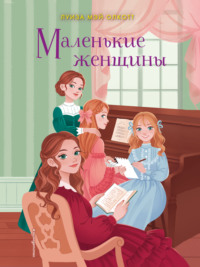 полная версия
полная версияLouisa May Alcott : Her Life, Letters, and Journals
[I have, for I most sincerely think that the little girl "got religion" that day in the wood when dear mother Nature led her to God.–L. M. A., 1885.]
One of Louisa's strongest desires at this time was for a room of her own, where she might have the solitude she craved to dream her dreams and work out her fancies. These sweet little notes and an extract from her journal show how this desire was felt and gratified.
Dearest Mother,–I have tried to be more contented, and I think I have been more so. I have been thinking about my little room, which I suppose I never shall have. I should want to be there about all the time, and I should go there and sing and think.
But I'll be contentedWith what I have got;Of folly repented,Then sweet is my lot.From your trying daughter,Louy.My dear Louisa,–Your note gave me so much delight that I cannot close my eyes without first thanking you, dear, for making me so happy, and blessing God who gave you this tender love for your mother.
I have observed all day your patience with baby, your obedience to me, and your kindness to all.
Go on "trying," my child; God will give you strength and courage, and help you fill each day with words and deeds of love. I shall lay this on your pillow, put a warm kiss on your lips, and say a little prayer over you in your sleep.
Mother.My Louy,–I was grieved at your selfish behavior this morning, but also greatly pleased to find you bore so meekly Father's reproof for it. That is the way, dear; if you find you are wrong, take the discipline sweetly, and do so no more. It is not to be expected that children should always do right; but oh, how lovely to see a child penitent and patient when the passion is over.
I thought a little prayer as I looked at you, and said in my heart, "Dear God, sustain my child in this moment of trial, that no hasty word, no cruel look, no angry action may add to her fault." And you were helped. I know that you will have a happy day after the storm and the gentle shower; keep quiet, read, walk, but do not talk much till all is peace again.
Mother.Hillside, Concord.Dear,–I am glad you put your heart in the right place; for I am sure all true strength comes from above. Continue to feel that God is near you, dear child, and He never will forsake you in a weak moment. Write me always when you feel that I can help you; for, though God is near, Mother never forgets you, and your refuge is her arms.
Patience, dear, will give us content, if nothing else. Be assured the little room you long for will come, if it is necessary to your peace and well-being. Till then try to be happy with the good things you have. They are many,–more perhaps than we deserve, after our frequent complaints and discontent.
Be cheerful, my Louy, and all will be gayer for your laugh, and all good and lovely things will be given to you when you deserve them.
I am a busy woman, but never can forget the calls of my children.
Mother.Dearest,–I am sure you have lived very near to God to-day, you have been so good and happy. Let each day be like this, and life will become a sweet song for you and all who love you,–none so much as your
Mother.Thirteen Years OldHillside.March, 1846.– I have at last got the little room I have wanted so long, and am very happy about it. It does me good to be alone, and Mother has made it very pretty and neat for me. My work-basket and desk are by the window, and my closet is full of dried herbs that smell very nice. The door that opens into the garden will be very pretty in summer, and I can run off to the woods when I like.
I have made a plan for my life, as I am in my teens and no more a child. I am old for my age, and don't care much for girl's things. People think I'm wild and queer; but Mother understands and helps me. I have not told any one about my plan; but I'm going to be good. I've made so many resolutions, and written sad notes, and cried over my sins, and it doesn't seem to do any good! Now I'm going to work really, for I feel a true desire to improve, and be a help and comfort, not a care and sorrow, to my dear mother.
Fifteen Years OldSunday, Oct. 9, 1847.– I have been reading to-day Bettine's correspondence with Goethe.
She calls herself a child, and writes about the lovely things she saw and heard, and felt and did. I liked it much.
[First taste of Goethe. Three years later R. W. E. gave me "Wilhelm Meister," and from that day Goethe has been my chief idol.–L. M. A., 1885.]
The experiment at Fruitlands was (outwardly) an utter failure, and had exhausted Mr. Alcott's resources of mind, body, and estate. Louisa has not exaggerated the collapse which followed. But the brave, loving mother could not give way to despondency, for she had her young to care for. After a few days Mr. Alcott rose from his despair, and listened to her counsel. They lived a short time at Still River, and then returned to Concord; but not to the happy little cottage.
Mr. Alcott sought such work as he could find to do with his hands; but it was scanty and insufficient. Mrs. Alcott subdued her proud heart to the necessity of seeking help from friends. They had a few rooms in the house of a kind neighbor, who welcomed them to her house, in addition to her own large family; and there they struggled with the poverty which Louisa for the first time fully realized.
Yet her journal says little of the hardships they endured, but is full of her mental and moral struggles. It was characteristic of this family that they never were conquered by their surroundings. Mr. Alcott might retire into sad and silent musing, Mrs. Alcott's warm, quick temper, might burst out into flame, the children might be quarrelsome or noisy; but their ideal of life always remained high, fresh, and ennobling. Their souls always "knew their destiny divine," and believed that they would find fitting expression in life some time. "Chill penury" could not repress "their noble rage," nor freeze "the genial current" of their souls.
The children escaped from the privations of daily life into a world of romance, and in the plays in the old barn revelled in luxury and splendor. This dramatic tendency was very strong in Louisa, and she never outgrew it. It took various shapes and colors, and at one time threatened to dominate her life.
The education of the children was certainly desultory and insufficient; but it was inspiring, and brought out their powers. They learned to feel and to think justly, and to express their thoughts and feelings freely and forcibly, if they did not know well the rules of grammar and rhetoric. Mr. Alcott always loved the study of language, and became a master of it; while Mrs. Alcott had a rich and well-chosen vocabulary, gained from the intelligent companions of her youth and the best literature, which she read freely. Mr. Alcott made great use of the study of language in his teaching, and often employed the definition of a word to convey a lesson or a rebuke. The children were encouraged, and even required, to keep their journals regularly, and to write letters. Their efforts at poetry or the drama were not laughed at, but treasured by their parents as indications of progress. Mr. Alcott's records of his own theory and practice in the education of children are full of valuable suggestion, and much yet remains buried in his journals. The girls had full freedom to act out their natures, with little fear of ridicule or criticism. An innate sense of dignity and modesty kept them from abusing this liberty; and perhaps nowhere in the world could it have been more safely indulged than in the simple life of Concord, whose very atmosphere seemed then filled with a spiritual presence which made life free, pure, and serene.
Louisa gives this interesting anecdote of their life at that time:–
People wondered at our frolics, but enjoyed them, and droll stories are still told of the adventures of those days. Mr. Emerson and Margaret Fuller were visiting my parents one afternoon, and the conversation having turned to the ever interesting subject of education, Miss Fuller said:–
"Well, Mr. Alcott, you have been able to carry out your methods in your own family, and I should like to see your model children."
She did in a few moments, for as the guests stood on the door-steps a wild uproar approached, and round the corner of the house came a wheelbarrow holding baby May arrayed as a queen; I was the horse, bitted and bridled, and driven by my elder sister Anna; while Lizzie played dog, and barked as loud as her gentle voice permitted.
All were shouting and wild with fun, which, however, came to a sudden end as we espied the stately group before us; for my foot tripped, and down we all went in a laughing heap; while my mother put a climax to the joke by saying, with a dramatic wave of the hand,–
"Here are the model children, Miss Fuller."
They were undoubtedly very satisfactory to Miss Fuller, who partook largely of the educational views of that time, and who loved to tell anecdotes of this family. One of the sisters writes in her diary: "She said prayers; but I think my resolutions to be good are prayers."
In 1841 Colonel May, Mrs. Alcott's father, died and left her a small amount of property. Mrs. Alcott decided to purchase with this a house in Concord, and the addition of five hundred dollars from Mr. Emerson, who was always the good Providence of the family, enabled her in 1845 to buy the place in Concord known as Hillside. This house is on the road to Lexington, about one third of a mile from Mr. Emerson's home. It was afterward occupied by Mr. Hawthorne.
In this house the girlish life of Louisa was passed, which she has represented so fully in "Little Women," and of which she speaks in her journal as the happiest time of her life. Yet she was not unmindful of the anxiety of her parents; and the determined purpose to retrieve the fortunes of the family and to give to her mother the comfort and ease which she had never known in her married life became the constant motive of her conduct. It is in the light of this purpose alone that her character and her subsequent career can be fully understood. She naturally thought of teaching as her work, and had for a short time a little school in the barn for Mr. Emerson's children and others.
It was indeed a great comfort to be sure of the house over their heads, but there were still six mouths to be fed, six bodies to be clothed, and four young, eager minds to be educated. Concord offered very little opportunity for such work as either Mr. or Mrs. Alcott could do, and at last even the mother's brave heart broke down. She was painfully anxious about the support of her household. A friend passing through Concord called upon her, and Mrs. Alcott could not hide the traces of tears on her face. "Abby Alcott, what does this mean?" said the visitor, with determined kindness. The poor mother opened her heart to her friend, and told the story of their privations and sufferings.
"Come to Boston, and I will find you employment," said the friend.
The family removed to Boston in 1848, and Mrs. Alcott became a visitor to the poor in the employ of one or more benevolent societies, and finally kept an intelligence office. Her whole heart went into her work; and the children, as well as the mother, learned many valuable lessons from it. Her reports of her work are said to have been very interesting, and full of valuable suggestion.
Mr. Alcott began to hold conversations in West Street. He attracted a small circle of thoughtful men and women about him, who delighted in the height of his aspirations and the originality of his thoughts. It was congenial occupation for him, and thus added to the happiness of the family, though very little to its pecuniary resources. His price of admission was small, and he freely invited any one who would enjoy the meetings although unable to pay for them. He was a great and helpful influence to young minds. Besides the morally pure and spiritually elevated atmosphere of thought to which they were introduced by him, they found a great intellectual advantage in the acquaintance with ancient poets and philosophers, into whose life he had entered sympathetically. His peculiar theories of temperament and diet never failed to call out discussion and opposition. One of my earliest recollections of Louisa is on one of these occasions, when he was emphasizing his doctrine that a vegetable diet would produce unruffled sweetness of temper and disposition. I heard a voice behind me saying to her neighbor: "I don't know about that. I've never eaten any meat, and I'm awful cross and irritable very often."
On her fourteenth birthday her mother wrote her the following poem, with a present of a pen. It was a prophetic gift, and well used by the receiver.
Oh, may this pen your muse inspire,When wrapt in pure poetic fire,To write some sweet, some thrilling verse;A song of love or sorrow's lay,Or duty's clear but tedious wayIn brighter hope rehearse.Oh, let your strain be soft and high,Of crosses here, of crowns beyond the sky;Truth guide your pen, inspire your theme,And from each note joy's music stream.[Original, I think. I have tried to obey.–L. M. A., 1885.]
In a sketch written for a friend, Louisa gives this account of the parents' influence on the children:–
When cautious friends asked mother how she dared to have such outcasts among her girls, she always answered, with an expression of confidence which did much to keep us safe, "I can trust my daughters, and this is the best way to teach them how to shun these sins and comfort these sorrows. They cannot escape the knowledge of them; better gain this under their father's roof and their mother's care, and so be protected by these experiences when their turn comes to face the world and its temptations." Once we carried our breakfast to a starving family; once lent our whole dinner to a neighbor suddenly taken unprepared by distinguished guests. Another time, one snowy Saturday night, when our wood was very low, a poor child came to beg a little, as the baby was sick and the father on a spree with all his wages. My mother hesitated at first, as we also had a baby. Very cold weather was upon us, and a Sunday to be got through before more wood could be had. My father said, "Give half our stock, and trust in Providence; the weather will moderate, or wood will come." Mother laughed, and answered in her cheery way, "Well, their need is greater than ours, and if our half gives out we can go to bed and tell stories." So a generous half went to the poor neighbor, and a little later in the eve, while the storm still raged and we were about to cover our fire to keep it, a knock came, and a farmer who usually supplied us appeared, saying anxiously, "I started for Boston with a load of wood, but it drifts so I want to go home. Wouldn't you like to have me drop the wood here; it would accommodate me, and you needn't hurry about paying for it." "Yes," said Father; and as the man went off he turned to Mother with a look that much impressed us children with his gifts as a seer, "Didn't I tell you wood would come if the weather did not moderate?" Mother's motto was "Hope, and keep busy," and one of her sayings, "Cast your bread upon the waters, and after many days it will come back buttered."
CHAPTER IV
THE SENTIMENTAL PERIOD
A SONG FROM THE SUDSQueen of my tub, I merrily sing,While the white foam rises high,And sturdily wash, and rinse, and wring,And fasten the clothes to dry;Then out in the free fresh air they swing,Under the sunny sky.I wish we could wash from our hearts and our soulsThe stains of the week away,And let water and air by their magic makeOurselves as pure as they;Then on the earth there would be indeedA glorious washing-day!Along the path of a useful lifeWill heart's-ease ever bloom;The busy mind has no time to thinkOf sorrow, or care, or gloom;And anxious thoughts may be swept awayAs we busily wield a broom.I am glad a task to me is givenTo labor at day by day;For it brings me health, and strength, and hope,And I cheerfully learn to say,–"Head, you may think; heart, you may feel;But hand, you shall work alway!"THE period of free, happy childhood was necessarily short, and at about the age of fifteen Louisa Alcott began to feel the pressure of thoughts and duties which made life a more solemn matter. In spite of the overflowing fun which appears in her books, her nature was very serious, and she could not cast aside care lightly. So many varying tendencies existed in her character that she must have struggled with many doubts and questions before finding the true path. But she always kept the pole-star of right strictly in view, and never failed in truth to that duty which seemed to her nearest and most imperative. If she erred in judgment, she did not err in conscientious fidelity.
Her mother's rules for her guidance were–
Rule yourself.
Love your neighbor.
Do the duty which lies nearest you.
She never lost sight of these instructions.
I will introduce this period in her own words, as written later for the use of a friend.
My romantic period began at fifteen, when I fell to writing poetry, keeping a heart-journal, and wandering by moonlight instead of sleeping quietly. About that time, in browsing over Mr. Emerson's library, I found Goethe's "Correspondence with a Child," and at once was fired with a desire to be a Bettine, making my father's friend my Goethe. So I wrote letters to him, but never sent them; sat in a tall cherry-tree at midnight, singing to the moon till the owls scared me to bed; left wild flowers on the doorstep of my "Master," and sung Mignon's song under his window in very bad German.
Not till many years later did I tell my Goethe of this early romance and the part he played in it. He was much amused, and begged for his letters, kindly saying he felt honored to be so worshipped. The letters were burnt long ago, but Emerson remained my "Master" while he lived, doing more for me,–as for many another,–than he knew, by the simple beauty of his life, the truth and wisdom of his books, the example of a great, good man, untempted and unspoiled by the world which he made better while in it, and left richer and nobler when he went.
The trials of life began about this time, and happy childhood ended. One of the most memorable days of my life is a certain gloomy November afternoon, when we had been holding a family council as to ways and means. In summer we lived much as the birds did, on our fruit and bread and milk; the sun was our fire, the sky our roof, and Nature's plenty made us forget that such a thing as poverty existed.
In 1850 she heads her diary "The Sentimental Period." She was then seventeen years old, but her diary gives no hint of the sentimental notions that often fill the heads of young girls at that period. The experiences of Jo with her charming young neighbor in "Little Women" do not represent hers at all.
One bit of romance was suggested by Goethe's "Correspondence with a Child." It may be difficult for readers of to-day to understand the fascination which this book exercised upon young minds of the last generation, yet it is certain that it led more than one young girl to form an ideal attachment to a man far older than herself, but full of nobility and intellectual greatness. Theodore Parker said of letters addressed to him by a young New Hampshire girl, "They are as good as Bettine's without the lies." This mingling of idealism and hero-worship was strongly characteristic of that transcendental period when women, having little solid education and less industrial employment, were full of noble aspirations and longings for fuller and freer life, which must find expression in some way.
The young woman of to-day, wearing waterproof and india-rubber boots, skating, driving, and bicycling, studying chemistry in the laboratory, exhibiting her pictures in open competition, adopting a profession without opposition, and living single without fear of reproach, has less time for fancies and more regard for facts.
Miss Alcott was safe in choosing her idol. Worship of Emerson could only refine and elevate her thoughts, and her intimate acquaintance with his beautiful home chastened her idolatry into pure reverent friendship which never failed her. She kept her worship to herself, and never sent him the letters in which she poured out the longings and raptures which filled her girlish heart.
Her diary, which was revised by herself in later years, tells the story of this period quite fully. The details may seem trifling, but they help to illustrate this important formative period of her life.
JournalTHE SENTIMENTAL PERIODBoston, May, 1850.– So long a time has passed since I kept a journal that I hardly know how to begin. Since coming to the city I don't seem to have thought much, for the bustle and dirt and change send all lovely images and restful feelings away. Among my hills and woods I had fine free times alone, and though my thoughts were silly, I daresay, they helped to keep me happy and good. I see now what Nature did for me, and my "romantic tastes," as people called that love of solitude and out-of-door life, taught me much.
This summer, like the last, we shall spend in a large house (Uncle May's, Atkinson Street), with many comforts about us which we shall enjoy, and in the autumn I hope I shall have something to show that the time has not been wasted. Seventeen years have I lived, and yet so little do I know, and so much remains to be done before I begin to be what I desire,–a truly good and useful woman.
In looking over our journals, Father says, "Anna's is about other people, Louisa's about herself." That is true, for I don't talk about myself; yet must always think of the wilful, moody girl I try to manage, and in my journal I write of her to see how she gets on. Anna is so good she need not take care of herself, and can enjoy other people. If I look in my glass, I try to keep down vanity about my long hair, my well-shaped head, and my good nose. In the street I try not to covet fine things. My quick tongue is always getting me into trouble, and my moodiness makes it hard to be cheerful when I think how poor we are, how much worry it is to live, and how many things I long to do I never can.
So every day is a battle, and I'm so tired I don't want to live; only it's cowardly to die till you have done something.
I can't talk to any one but Mother about my troubles, and she has so many now to bear I try not to add any more. I know God is always ready to hear, but heaven's so far away in the city, and I so heavy I can't fly up to find Him.
FAITHWritten in the diaryOh, when the heart is full of fearsAnd the way seems dim to heaven,When the sorrow and the care of yearsPeace from the heart has driven,–Then, through the mist of falling tears,Look up and be forgiven.Forgiven for the lack of faithThat made all dark to thee,Let conscience o'er thy wayward soulHave fullest mastery:Hope on, fight on, and thou shalt winA noble victory.Though thou art weary and forlorn,Let not thy heart's peace go;Though the riches of this world are gone,And thy lot is care and woe,Faint not, but journey hourly on:True wealth is not below.Through all the darkness still look up:Let virtue be thy guide;Take thy draught from sorrow's cup,Yet trustfully abide;Let not temptation vanquish thee,And the Father will provide.[We had small-pox in the family this summer, caught from some poor immigrants whom mother took into our garden and fed one day. We girls had it lightly, but Father and Mother were very ill, and we had a curious time of exile, danger, and trouble. No doctors, and all got well.–L. M. A.]
July, 1850.–Anna is gone to L. after the varioloid. She is to help Mrs. – with her baby. I had to take A.'s school of twenty in Canton Street. I like it better than I thought, though it's very hard to be patient with the children sometimes. They seem happy, and learn fast; so I am encouraged, though at first it was very hard, and I missed Anna so much I used to cry over my dinner and be very blue. I guess this is the teaching I need; for as a school-marm I must behave myself and guard my tongue and temper carefully, and set an example of sweet manners.
I found one of mother's notes in my journal, so like those she used to write me when she had more time. It always encourages me; and I wish some one would write as helpfully to her, for she needs cheering up with all the care she has. I often think what a hard life she has had since she married,–so full of wandering and all sorts of worry! so different from her early easy days, the youngest and most petted of her family. I think she is a very brave, good woman; and my dream is to have a lovely, quiet home for her, with no debts or troubles to burden her. But I'm afraid she will be in heaven before I can do it. Anna, too, she is feeble and homesick, and I miss her dreadfully; for she is my conscience, always true and just and good. She must have a good time in a nice little home of her own some day, as we often plan. But waiting is so hard!









